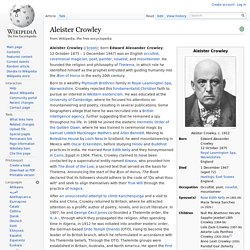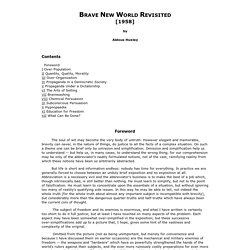

Aldous Huxley Recollected: An Oral History - David K. Dunaway - Google Livros. Brave New World Revisited - Aldous Huxley - Google Livros. Aldous Huxley Oligarchy by drugs and Abe. Aleister Crowley. After an unsuccessful attempt to climb Kanchenjunga and a visit to India and China, Crowley returned to Britain, where he attracted attention as a prolific author of poetry, novels, and occult literature.

In 1907, he and George Cecil Jones co-founded a Thelemite order, the A∴A∴, through which they propagated the religion. After spending time in Algeria, in 1912 he was initiated into another esoteric order, the German-based Ordo Templi Orientis (OTO), rising to become the leader of its British branch, which he reformulated in accordance with his Thelemite beliefs. Through the OTO, Thelemite groups were established in Britain, Australia, and North America. Brave New World Revisited (1958) by Aldous Huxley. Contents Foreword I Over-PopulationII Quantity, Quality, Morality III Over-Organization IV Propaganda in a Democratic Society V Propaganda Under a Dictatorship VI The Arts of Selling VII Brainwashing VIII Chemical Persuasion IX Subconscious Persuasion X Hypnopaedia XI Education for Freedom XII What Can Be Done?

Foreword. The Aquarian Conspiracy. In the spring of 1980, a book appeared called The Aquarian Conspiracy that put itself forward as a manifesto of the counterculture.

Defining the counterculture as the conscious embracing of irrationality—from rock and drugs to biofeedback, meditation, "consciousness-raising," yoga, mountain climbing, group therapy, and psychodrama. The Aquarian Conspiracy declares that it is now time for the 15 million Americans involved in the counterculture to join in bringing about a "radical change in the United States. " Writes author Marilyn Ferguson: "While outlining a not-yet-titled book about the emerging social alternatives, I thought again about the peculiar form of this movement; its atypical leadership, the patient intensity of its adherents, their unlikely successes.
It suddenly struck me that in their sharing of strategies, their linkage, and their recognition of each other by subtle signals, the participants were not merely cooperating with one another. They were in collusion. Aldous Huxley: Man's Almost Infinite Appetite For Distractions. Man's Almost Infinite Appetite For Distractions.

By Aldous Huxley “In regard to propaganda the early advocates of universal literacy and a free press envisaged only two possibilities: the propaganda might be true, or the propaganda might be false.